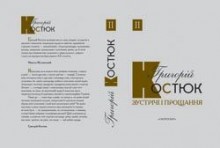On June 3, 2008, at Kyiv- Mohyla Academy, Smoloskyp Publishers launched Hryhorii Kostiuk’s two-volume collection of memoirs entitled Zustrichi ta proshchannia (Meetings and Farewells). Kostiuk, a noted Ukrainian literary critic, was destined to spend his youth in the 1920s and 1930s, one of the most tragic eras in our literary history. In 1925-29, Hryhorii Kostiuk studied in Kyiv and attended courses taught by Mykola Zerov and Borys Yakubovsky. He moved to Kharkiv sometime in the 1930s and joined the POLITFRONT literary association, where he rubbed shoulders with Mykola Khvylovy, Mykola Kulish, Pavlo Tychyna, Yurii Yanovsky, Ivan Bahriany, Ostap Vyshnia, and other famous writers. Kostiuk was witness to Stalin’s ruthless reprisals against the Ukrainian intelligentsia and ended up as an inmate of a Soviet labor camp.
“The first volume of Meetings and Farewells is devoted precisely to this period in Hryhorii Kostiuk’s life,” explained Rostyslav Semkiv, the director of Smoloskyp. “The second volume encompasses the 1940s-1960s, in other words, the period of his literary process in emigration. These memoirs have no analogs. Until recently, Yurii Smolych’s Rozpovid pro nespokii (A Tale of Unrest, 1968) were regarded as the most noteworthy memoirs on the subject of literary Kyiv and Kharkiv in the 1920s-1930s.
“However, Meetings and Farewells was written in the emigration, in other words without any censorial intrusions, which gives this work a considerably larger scope. It will be interesting to philologists and literary historians as well as people who are interested in the living history of culture,” Semkiv said.
Volodymyr Panchenko, who teaches at Kyiv-Mohyla Academy, also attended the launch of Kostiuk’s book of memoirs. “It took me three stages to acquaint myself with Hryhorii Kostiuk as a literary critic and a person. In the early 1990s, I was fortunate to read his book Volodymyr Vynnychenko and his Age (he was one of the first to embark on Vynnychenko studies). Then I read the two-volume emigre edition of Meetings and Farewells . I must admit that these memoirs are fascinating the way they reveal the atmosphere of literary life in Ukraine from the 1920s until the late period in Kostiuk’s creative life. The author depicts not only the colorful panorama of literary life but also personalities, many of whom were his close friends.
“With the second volume begins the account of his immigration period, in which Kostiuk also took on the role of a scrupulous chronicler, who was capable of portraying the atmosphere of the era and the human dimension at the same time. In 2000 I visited the United States and met the late Leonid Kutsenko. Together we visited the 98-year-old Hryhorii Kostiuk. With my own eyes I saw this celebrated literary historian, who was emaciated by age and illness. Sitting across from him was the 92 year-old Yurii Shevelov, wholater joked that it was obscene to live as long as he and Kostiuk had. It was a moving and sentimental meeting. It is recorded on photos and in my memories. I am delighted to see that the book Meetings and Farewells has now appeared in Ukraine, because earlier these memoirs were accessible only to a narrow circle of researchers. Now this circle will expand.”
The book launch was attended by Viacheslav Briukhovetsky, Ivan Dziuba, Ivan Drach, Ihor Rymaruk, Yevhen Sverstiuk, Volodymyr Morenets, Dmytro Pavlychko, Vira Aheieva, Serhii Bilokin, Raisa Ivanchenko, and Kostiuk’s son Teodor. Mykola Zhulynsky was the emcee. On May 6 Kostiuk’s book was launched in the author’s home town of Kamianets-Podilsky.







